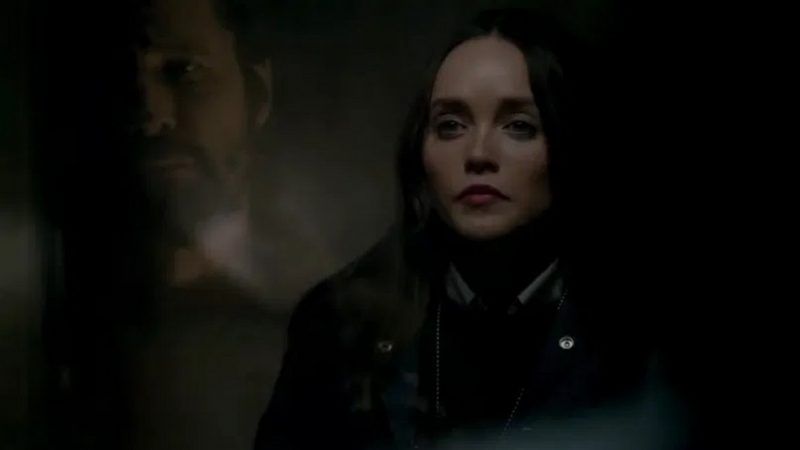Clarice Explores What Happens After Hannibal Lecter's Story Ends
CBS drama explores the heroine’s trauma and the envy of her FBI peers.

Clarice. CBS. Thursday, February 11, 10 p.m.
So, who do we love more? Hannibal Lecter, the cannibal gourmet and charming psychopath? Or Clarice Starling, his hillbilly protégé from the other side of the law who channels Lecter's murderous expertise into more civilized purposes? When the two first appeared together in Jonathan Demme's Silence of the Lambs, their work won five Oscars and grossed $273 million. The American Film Institute named Lecter the greatest villain in film history and Starling the greatest heroine. Together and separately, they've appeared in four novels, five films and, with CBS' new Clarice, two television series.
Well, that question won't be answered in Clarice. Not only is Lecter not present, his name literally can't be even be spoken due to some tangle over legal rights to the characters. Hannibal's fans will have to be satisfied by a single reference, a crack made by a snotty FBI shrink who contemptuously notes to Starling that her "last therapist was an inmate in the Baltimore Hospital for the Criminally Insane who, you know, ate his patients."
If that remark seems to you to imply that Starling is seeing an analyst, which in turn implies that Lecter is not the only one in their peculiar relationship who's a brick or two shy of a full load, you're onto the central premise of Clarice: A year after she, with Lecter's aid, tracked down a monstrous serial killer who was sewing the skin of his female victims into a costume, the young Starling (she was only a year out of the FBI academy at the time of The Silence of the Lambs) is suspected of suffering burnout. Or "PTSD of the most egregious kind," as her bullying FBI therapist puts it in a sneering declaration that sounds less like a diagnosis than an accusation.
Along with the suspicion of burnout, Starling is being crushed by the vituperative jealousy of FBI officials—most of them older men—who resent the success of her serial-killer investigation and all the publicity that went with it. Declares one boss—who, not coincidentally, had led the investigation in an appallingly wrong direction: "I think you got lucky." (Clarice's relentless portrait of an FBI dominated by envious backbiting and sabotage may seem overdrawn, but it's actually depressingly accurate, going clear back to the 1930s, when Melvin Purvis—the agent who oversaw the takedowns of John Dillinger, Pretty Boy Floyd and Baby Face Nelson, the second-most admired man in America in a Literary Digest poll—was reassigned to inspections of backwater offices in FBI Siberia by J. Edgar Hoover and his spiteful nomenklatura.)
The poisonous stew of resentment and medical slander have all but buried Starling, who has been removed from the field and now shuffles files in the basement of the FBI's behavioral science unit. But the FBI's swirling political winds blow her back into the agency's forefront when several savagely mutilated bodies of women are fished out of the Potomac River. The new attorney general, appointed as part of a crackdown on violent crime, decides making Starling the public face of a task force assigned to find the new serial killer—even if it means she'll be working with men who despise her—will be a masterful publicity stunt.
Clarice's reconception of Starling—as damaged, as a political sock puppet, and as an intelligent but not particularly gifted detective now that she's deprived of the counsel of the cannibalistic genius Lecter—gives the show, which is otherwise a simple if dark crime procedural, some serious punch. So does another wrinkle: Starling really does have some psychological kinks stemming from her first serial killing investigation. When the FBI therapist accuses her of covering up her problems—"Clarice, you've been deflecting like a pro for a full year now"—his motives may be reptilian, but he's not wrong.
Aiding Clarice considerably is the performance of Australian actress Rebecca Breeds (Pretty Little Liars) as Starling. Breeds wisely patterns her diffident, even shy, Clarice after that of Jodie Foster in Silence of the Lambs, cloaking her intellectual capacity in bashful humility toward authority that sometimes cracks open to reveal repressed rage. Starling's venomous male FBI enemies—particularly Michael Cudlitz (The Walking Dead) as her supervisor and Shawn Doyle (House Of Cards) as her supervisor—are all maddeningly hateful, while Devyn A. Taylor brings some piquant comic relief as another embattled female agent who keeps a journal titled "People I'm Sending To Hell." They aren't all criminals.
